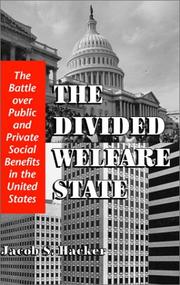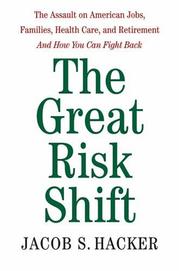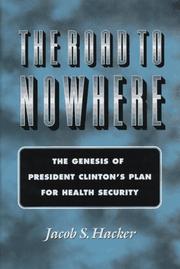| Listing 1 - 10 of 26 | << page >> |
Sort by
|
Book
ISBN: 9780231146036 0231146035 Year: 2008 Volume: *1 Publisher: New York Columbia University Press Social Science Research Council
Abstract | Keywords | Export | Availability | Bookmark
 Loading...
Loading...Choose an application
- Reference Manager
- EndNote
- RefWorks (Direct export to RefWorks)
Health care reform --- Medical policy --- United States --- Health services accessibility --- Insurance [Health ] --- Insurance --- Health care reform - United States --- Medical policy - United States

ISBN: 0521013283 0521812887 1139931016 1139927663 0511817290 Year: 2002 Publisher: Cambridge : Cambridge University Press,
Abstract | Keywords | Export | Availability | Bookmark
 Loading...
Loading...Choose an application
- Reference Manager
- EndNote
- RefWorks (Direct export to RefWorks)
The Divided Welfare State is the first comprehensive political analysis of America's system of public and private social benefits. Everyone knows that the American welfare state is less expensive and extensive, later to develop and slower to grow, than comparable programs abroad. American social spending is as high as spending in many European nations. What is distinctive is that so many social welfare duties are handled by the private sector with government support. With historical reach and statistical and cross-national evidence, The Divided Welfare State demonstrates that private social benefits have not been shaped by public policy, but have deeply influenced the politics of public social programs - to produce a social policy framework whose political and social effects are strikingly different than often assumed. At a time of fierce new debates about social policy, this book is essential to understanding the roots of America's distinctive model and its future possibilities.
Privatization --- Welfare state --- #SBIB:316.8H40 --- #SBIB:328H31 --- #SBIB:35H437 --- State, Welfare --- Economic policy --- Public welfare --- Social policy --- State, The --- Welfare economics --- Sociaal beleid: social policy, sociale zekerheid, verzorgingsstaat --- Instellingen en beleid: VSA / USA --- Beleidssectoren: sociale zekerheid --- United States --- Social policy. --- Social Sciences --- Political Science

ISBN: 0195335341 9780195335347 Year: 2008 Publisher: New York: Oxford university press,
Abstract | Keywords | Export | Availability | Bookmark
 Loading...
Loading...Choose an application
- Reference Manager
- EndNote
- RefWorks (Direct export to RefWorks)

ISBN: 9780521812887 9780521013284 9780511817298 Year: 2010 Publisher: Cambridge Cambridge University Press
Abstract | Keywords | Export | Availability | Bookmark
 Loading...
Loading...Choose an application
- Reference Manager
- EndNote
- RefWorks (Direct export to RefWorks)
Social policy --- Social security law --- United States of America
Book
ISBN: 9780691044231 Year: 1997 Publisher: Princeton, N.J.,
Abstract | Keywords | Export | Availability | Bookmark
 Loading...
Loading...Choose an application
- Reference Manager
- EndNote
- RefWorks (Direct export to RefWorks)

ISBN: 9780195179507 Year: 2006 Publisher: Oxford Oxford university press
Abstract | Keywords | Export | Availability | Bookmark
 Loading...
Loading...Choose an application
- Reference Manager
- EndNote
- RefWorks (Direct export to RefWorks)
Economic security --- United States --- Economic conditions. --- Social policy.
Book
ISBN: 9780190844158 Year: 2019 Publisher: Oxford Oxford University Press, Incorporated
Abstract | Keywords | Export | Availability | Bookmark
 Loading...
Loading...Choose an application
- Reference Manager
- EndNote
- RefWorks (Direct export to RefWorks)
Well before the late-2000s financial crisis, economic risk was shifting from the broad shoulders of government and business onto the fragile backs of American families. In this fully revised second edition, Jacob Hacker presents startling new evidence of Americans' increasing insecurity in the post-financial crash era and compelling new ideas to restore the American Dream.
Book
ISBN: 0190844167 0190844159 Year: 2019 Publisher: Oxford University Press
Abstract | Keywords | Export | Availability | Bookmark
 Loading...
Loading...Choose an application
- Reference Manager
- EndNote
- RefWorks (Direct export to RefWorks)
On the eve of the financial crisis, Jacob S. Hacker wrote "the policy book of the year" (E.J. Dionne, Jr., Washington Post), demonstrating and explaining the hidden story of growing economic insecurity. In this fully revised and updated second edition, he brings his powerful expose of "The Great Risk Shift" up to date with startling new evidence and compelling new ideas. Hacker shows that the safety net was unraveling long before the late-2000s, as more and more economic risk shifted from the broad shoulders of government and business onto the fragile backs of American families. Whether the problem is risky jobs brought on by corporate restructuring and the "gig economy" of contingent work, risky families created by the rising costs and instabilities of parenthood, risky retirement caused by the collapse of traditional guaranteed pensions, or risky health care fueled by skyrocketing costs and unstable coverage-Hacker shows what has changed and why, the ways in which ordinary Americans have been affected, and how we can fight back. Behind the risk shift, he contends, is the "Personal Responsibility Crusade" eagerly embraced by corporate leaders and conservative politicians who speak of an economic nirvana in which Americans are free to choose. But the result, Hacker reveals, has been very different: a harsh new world of economic insecurity in which far too many Americans are allowed to fall behind. Blending powerful human stories, big-picture analysis, and compelling ideas for reform, this remarkable volume has become a rallying point in the struggle for economic security in an increasingly uncertain world.
Economic security --- Risk --- American Dream. --- United States --- Economic conditions. --- American Dream
Book
ISBN: 0691221197 Year: 1999 Publisher: [Place of publication not identified] : Princeton Univ Press,
Abstract | Keywords | Export | Availability | Bookmark
 Loading...
Loading...Choose an application
- Reference Manager
- EndNote
- RefWorks (Direct export to RefWorks)
During the 1992 presidential campaign, health care reform became a hot issue, paving the way for one of the most important yet ill-fated social policy initiatives in American history: Bill Clinton's 1993 proposal for comprehensive coverage under "managed competition." Here Jacob Hacker not only investigates for the first time how managed competition became the president's reform framework, but also illuminates how issues and policies emerge. He follows Clinton's policy ideas from their initial formulation by policy experts through their endorsement by medical industry leaders and politicians to their inclusion--in a new and unexpected form--in the proposal itself. Throughout he explores key questions: Why did health reform become a national issue in the 1990s? Why did Clinton choose managed competition over more familiar options during the 1992 presidential campaign? What effect did this have on the fate of his proposal? Drawing on records of the President's task force, interviews with a wide range of key policy players, and many other sources, Hacker locates his analysis within the context of current political theories on agenda setting. He concludes that Clinton chose managed competition partly because advocates inside and outside the campaign convinced him that it represented a unique middle road to health care reform. This conviction, Hacker maintains, blinded the president and his allies to the political risks of the approach and hindered the development of an effective strategy for enacting it.
Health care reform --- Managed care plans (Medical care) --- United States --- Politics and government --- American Medical Association (AMA). --- American Prospect. --- Bergthold, Linda. --- Brookings Institution. --- Carville, James. --- Consumers Union. --- Daschle, Tom. --- Enthoven, Alain. --- Garamendi plan. --- Greenberg, Stan. --- Heritage Foundation. --- Johnson, Lyndon. --- Kennedy, Ted. --- Kingdon, John. --- Mayhew, David. --- Mitchell, George. --- New Democrats. --- Thorpe, Kenneth. --- Wofford, Harris. --- elite opinion. --- focusing events. --- inflation, medical. --- iron triangles. --- leadership: congressional. --- organized anarchies. --- payroll taxes. --- rationalizing politics. --- self-insurance health plans. --- utilization review.

ISBN: 0691044236 Year: 1997 Publisher: Princeton Princeton University Press
Abstract | Keywords | Export | Availability | Bookmark
 Loading...
Loading...Choose an application
- Reference Manager
- EndNote
- RefWorks (Direct export to RefWorks)
Health care reform --- Managed care plans (Medical care) --- United States --- Politics and government
| Listing 1 - 10 of 26 | << page >> |
Sort by
|

 Search
Search Feedback
Feedback About UniCat
About UniCat  Help
Help News
News